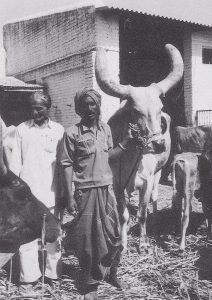Kindness To Animals
Panjarapolas
 A Jaina Panjarapola (shelter for cattle) in Panchasar, a village near Shankhesvara in Gujarat. When the cow of a Hindu has grown too old for giving milk he usually no longer feeds her but lets her roam about as she likes; under no circumstance would he kill her. To rescue these deserted animals from starvation or being killed by non-Jainas or non-Hindus has be- come a religious duty of the Jainas for as long as they can remember.
A Jaina Panjarapola (shelter for cattle) in Panchasar, a village near Shankhesvara in Gujarat. When the cow of a Hindu has grown too old for giving milk he usually no longer feeds her but lets her roam about as she likes; under no circumstance would he kill her. To rescue these deserted animals from starvation or being killed by non-Jainas or non-Hindus has be- come a religious duty of the Jainas for as long as they can remember.
This is done by providing shelters in which the animals are fed and cared for by paid low-caste Hindus and sometimes even Moslems. The expenses for running these shelters are met by committees who collect donations mostly from Jainas but also from wealthy Hindus and gov- ernmental sources.
From the JAIN DECLARATION ON NATURE which was presented to His Royal Highness Prince Philip, President of the World Wide Fund for Nature (WWF) International, on the 23rd October 1990 at Buckingham Palace: The transgressions against the vow of non-violence include all forms of cruelty to animals and human beings.
Many centuries ago, Jains condemned as evil the common practice of animal sacrifice to the gods. It is generally forbidden to keep animals in captivity, to whip, mutilate or overload them or to deprive them of adequate food and drink. The injunction is modified in respect of domestic animals to the extent that they may be roped or even whipped occasionally but always mercifully with due consideration and without anger.
Except for allowing themselves a judicious use of one-sensed life in the form of vegetables, Jains would not consciously take any life for food or sport. As a community they are strict vegetarians, consuming neither meat, fish nor eggs. They confine themselves to vegetable and milk products.
By taking the basic vows, the Jain laity endeavour to live a life of moderation and restraint and to practise a measure of abstinence and austerity. They must not procreate indiscriminately lest they overburden the universe and its resources. Regular periods of fasting for self-purification are encour aged. (Acknowledgement is offered to Dr. L. M. Singhvi, the author of the Declaration)